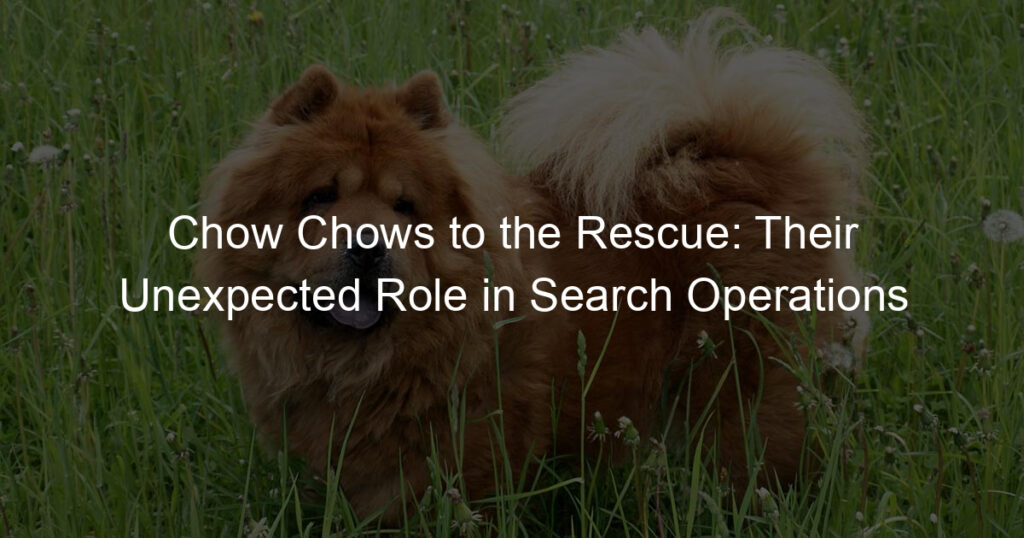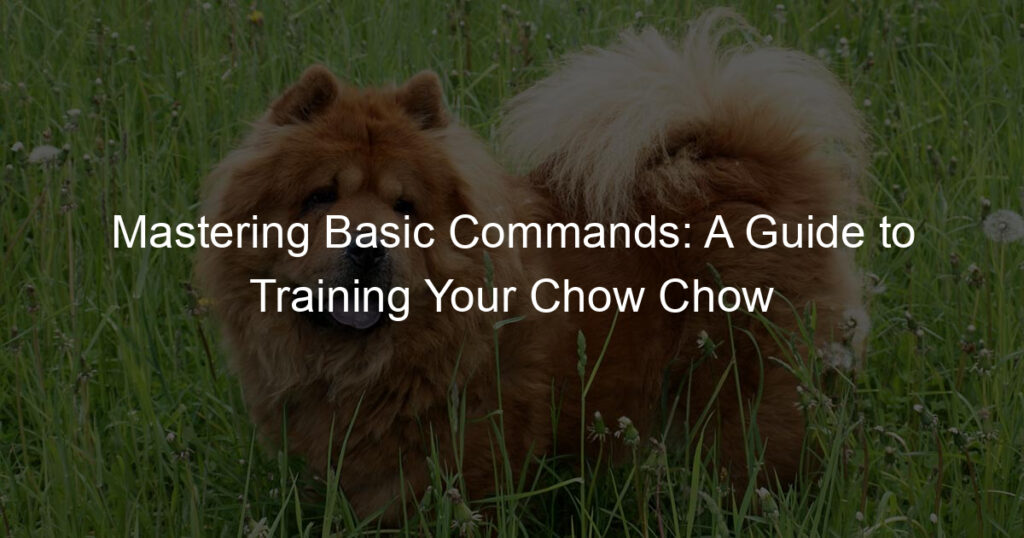Introduction to Chow Chow Socialization
Chow Chows, known for their lion-like appearance and aloof demeanor, are a unique breed that requires special attention when it comes to socialization. This process is crucial for their development and overall well-being. In this section, we will delve into the importance of socializing your Chow Chow and address some common misconceptions about this process.
- Understanding the importance of socializing your Chow Chow
- Common misconceptions about Chow Chow socialization
Socialization is a vital aspect of a Chow Chow’s life. It helps them become comfortable with different environments, people, and other animals. A well-socialized Chow Chow is typically happier, more relaxed, and less likely to exhibit aggressive or fearful behavior. According to a Wikipedia article, early socialization can help Chow Chows develop into well-rounded dogs. It’s recommended to start this process as early as possible, ideally when they are puppies.
There are several misconceptions about socializing Chow Chows. One common myth is that Chow Chows are naturally aggressive and cannot be socialized. This is untrue. While Chow Chows can be reserved and independent, they can also form strong bonds with their families and can get along well with strangers and other animals if properly socialized. Another misconception is that socialization is a one-time event. In reality, it’s an ongoing process that should continue throughout the dog’s life.
In the following sections, we will explore more about Chow Chow’s behavior and temperament, provide some training tips, and share successful socialization case studies. Stay tuned to learn more about how to make your Chow Chow a happy and sociable member of your family.
Understanding Chow Chow Behavior and Temperament
Chow Chows are a unique breed with distinct behaviors and temperaments. Understanding these can help you better connect with your pet and ensure they are comfortable and happy in their environment.
Chow Chow Pack Behavior
Chow Chows, like other dogs, are pack animals. This means they are naturally inclined to live and work in groups. Understanding their pack behavior can provide valuable insights into their actions and reactions.
- How Chow Chows behave in a pack
- Understanding the Chow Chow’s role in a pack
Chow Chows are known for their loyalty and protectiveness. In a pack setting, they often assume the role of a guardian, watching over their pack members and ensuring their safety. They are usually calm and reserved, but can be assertive when they feel their pack is threatened. They also tend to be independent, preferring to observe from a distance rather than engage in rough play.
Chow Chows are not typically the alpha in a pack. They are more likely to take on a protective role, acting as a guardian for their pack. They are often aloof with strangers but are deeply loyal to their pack members. Understanding this role can help you better manage your Chow Chow’s behavior and ensure they feel secure in their environment.
Understanding your Chow Chow’s behavior and temperament is key to building a strong bond with them. By recognizing their pack behavior, you can better meet their needs and ensure they are a happy and well-adjusted member of your family.
Chow Chow Individual Behavior
- Typical traits of the Chow Chow breed
- How to manage Chow Chow’s unique temperament
The Chow Chow breed is known for its unique personality traits. These dogs are often described as being aloof, independent, and reserved. They are not overly affectionate or needy, but they form strong bonds with their families and can be fiercely protective. Chow Chows are also known for their intelligence and stubbornness, which can make them a challenge to train. They are not typically aggressive, but they can be wary of strangers and may not get along well with other dogs, especially of the same sex. Despite their reserved nature, Chow Chows are loyal and devoted to their families. They are also known for their cleanliness and are often compared to cats in this regard. Learn more about Chow Chow traits here.
Managing a Chow Chow’s unique temperament requires patience, consistency, and understanding. It’s important to remember that these dogs are not typically outgoing or eager to please. They have their own minds and like to do things their own way. Training should be firm but gentle, and it should start from a young age. Socialization is also crucial for Chow Chows. They should be exposed to a variety of people, places, and experiences early in life to help them become well-rounded dogs. Despite their independent nature, Chow Chows do not like to be left alone for long periods. They need the companionship of their families and can become destructive if they are bored or lonely. Regular exercise and mental stimulation are also important for this breed. Find more tips on managing Chow Chow’s temperament here.
Chow Chow Training Tips
Training a Chow Chow can be a rewarding experience. These dogs are known for their loyalty and intelligence, but they also have a strong will and can be quite independent. Therefore, it’s crucial to use the right training techniques to ensure a well-behaved and sociable pet.
Training for Socialization
Socialization is an essential part of any dog’s training, especially for a breed like the Chow Chow. This breed can be aloof and reserved, so it’s crucial to introduce them to different environments, people, and other dogs from a young age. Here are some tips on how to do this effectively:
- How to introduce your Chow Chow to other dogs
- Training tips for improving Chow Chow’s social skills
Introducing your Chow Chow to other dogs should be done gradually and in a controlled environment. Start by allowing your Chow Chow to observe other dogs from a distance. Then, slowly decrease the distance over time. Always reward your Chow Chow for calm and non-aggressive behavior towards other dogs. This will help them associate positive experiences with other dogs.
Improving your Chow Chow’s social skills requires patience and consistency. Start by exposing your Chow Chow to different social situations, like walks in the park or visits to pet-friendly stores. Use positive reinforcement, like treats and praises, when your Chow Chow behaves well in these situations. Also, consider enrolling your Chow Chow in obedience classes or doggy daycare for more socialization opportunities.
Remember, every Chow Chow is unique and may require different training methods. Always stay patient and consistent, and don’t hesitate to seek professional help if needed. With time and effort, your Chow Chow can become a well-socialized and well-behaved companion.
Training for Behavior Management
Managing a Chow Chow’s behavior is crucial for a harmonious coexistence. This section will guide you on how to manage your Chow Chow’s pack behavior and control their temperament effectively.
- How to manage Chow Chow’s pack behavior
- Training techniques for controlling Chow Chow’s temperament
Chow Chows are known for their strong pack behavior. They are naturally dominant and may try to assert their authority over other pets or even their human family members. Understanding and managing this pack behavior is essential for a peaceful household.
Firstly, establish yourself as the pack leader. This can be done by setting boundaries and rules, and consistently enforcing them. Make sure your Chow Chow knows that you are in control of resources like food and toys. Regular training sessions can also help reinforce your position as the pack leader.
Secondly, socialize your Chow Chow with other dogs. This can help them understand their position in the pack and reduce aggressive behavior. Remember, socialization should be done gradually and in a controlled environment. Here is a useful resource for understanding dog behavior.
Chow Chows have a distinct temperament. They are independent, reserved, and can be stubborn. However, with the right training techniques, you can effectively control their temperament.
Positive reinforcement is a powerful technique. Reward your Chow Chow for good behavior with treats, praise, or playtime. This encourages them to repeat the behavior. On the other hand, ignore unwanted behavior. This sends a clear message that such behavior will not get them any rewards.
Consistency is key in training. Make sure all family members follow the same rules and use the same commands. This prevents confusion and helps your Chow Chow understand what is expected of them.
Patience is also important. Training a Chow Chow can take time, but the results are worth it. Remember, every Chow Chow is unique and may respond differently to training techniques. Find what works best for your Chow Chow and stick with it.
Integrating Your Chow Chow into the Pack
Welcoming a Chow Chow into your home is an exciting experience. However, it’s essential to prepare adequately for this new addition to ensure a smooth transition. Here are some steps to help you prepare for your Chow Chow’s integration.
Preparation for Integration
Before you bring your Chow Chow home, it’s crucial to make some preparations. This will help your new pet feel comfortable and safe in its new environment.
- Preparing your home for Chow Chow’s integration
- Preparing other dogs for Chow Chow’s arrival
Chow Chows are known for their independent and sometimes aloof nature. They appreciate having their own space. Therefore, create a dedicated area for your Chow Chow with a comfortable bed and toys. Remove any items that might be harmful or toxic to dogs. Also, Chow Chows are not the most active breed, but they still need regular exercise. Make sure your yard is secure and safe for them to play and explore.
If you have other dogs at home, it’s essential to prepare them for the new arrival. Start by introducing the scent of the Chow Chow to your existing dogs. You can do this by bringing home a blanket or toy that the Chow Chow has used. This will help your other dogs get used to the new scent. It’s also important to reinforce positive behavior in your existing dogs when they interact with the new scent. Reward them with treats and praise.
Remember, every dog is unique and might react differently to new situations. Be patient and give your Chow Chow and other pets time to adjust. With proper preparation and patience, integrating your Chow Chow into the pack can be a rewarding and enjoyable experience.
Steps for Successful Integration
Successfully integrating your Chow Chow into a pack of dogs requires careful planning and execution. Here are the essential steps to follow:
- Introducing your Chow Chow to the pack
- Monitoring Chow Chow’s interaction with other dogs
Introducing your Chow Chow to the pack is a critical first step. It’s important to do this in a controlled environment where you can monitor the interaction. Start by introducing your Chow Chow to one dog at a time. This allows your Chow Chow to get used to the presence of other dogs without feeling overwhelmed. Remember, each dog has its own personality and may react differently to the new member. Be patient and allow them to sniff and explore each other. This is a natural way for dogs to get to know each other.
Once your Chow Chow has been introduced to the pack, it’s crucial to monitor their interactions. Watch for signs of aggression or fear from either your Chow Chow or the other dogs. If you notice any negative behavior, separate the dogs immediately and try again later. It’s also important to reward positive interactions with treats and praise to encourage good behavior. Keep in mind, this process may take time, so patience is key.
Remember, every dog is unique and may require different methods of integration. What works for one Chow Chow may not work for another. The key is to be patient, consistent, and positive throughout the process.
For more information on Chow Chow behavior and temperament, visit Wikipedia.
Case Studies: Successful Chow Chow Socialization
Let’s dive into some real-life examples of successful Chow Chow socialization. These case studies will provide you with valuable insights and practical tips for integrating your Chow Chow into your pack or socializing a Chow Chow puppy with other dogs.
-
Case study 1: Integrating an adult Chow Chow into a pack
Meet Max, a 5-year-old Chow Chow who was introduced into a pack of three other dogs. Initially, Max was hesitant and displayed signs of anxiety. However, with patience and consistent training, Max was successfully integrated into the pack.
Max’s owner started by introducing him to the other dogs one at a time, in a neutral environment. This helped Max feel less overwhelmed. Gradually, they increased the time Max spent with the other dogs, always under supervision. They also used positive reinforcement techniques, rewarding Max for calm and friendly behavior towards the other dogs.
After several weeks, Max became comfortable with the other dogs and is now a happy and well-adjusted member of the pack. This case study shows that with patience, consistency, and the right techniques, an adult Chow Chow can be successfully integrated into a pack.
-
Case study 2: Socializing a Chow Chow puppy with other dogs
Next, let’s look at Bella, a Chow Chow puppy who was socialized with other dogs from a young age. Bella’s owner understood the importance of early socialization and started introducing her to other dogs when she was just 8 weeks old.
Bella was first introduced to other puppies at a local puppy socialization class. This provided a safe and controlled environment for Bella to interact with other dogs. Bella’s owner also arranged playdates with other dogs in their neighborhood, ensuring that Bella had positive experiences with dogs of all sizes and breeds.
Today, Bella is a friendly and sociable dog who enjoys the company of other dogs. This case study demonstrates the benefits of early socialization for Chow Chow puppies.
In conclusion, both case studies highlight the importance of patience, consistency, and positive reinforcement in Chow Chow socialization. Whether you’re integrating an adult Chow Chow into a pack or socializing a puppy, these principles can help ensure a successful outcome.
Conclusion: Enjoying Your Socialized Chow Chow
As we conclude this comprehensive guide, it’s important to reflect on the journey we’ve taken together. We’ve delved into the unique temperament and behavior of the Chow Chow breed, explored effective training tips, and learned how to integrate your Chow Chow into the pack. We’ve also looked at successful case studies of Chow Chow socialization. Now, let’s summarize the key takeaways and provide final tips to ensure your Chow Chow becomes a well-socialized member of your family.
- Key takeaways from the article
- Final tips for successful Chow Chow socialization
Chow Chows are a unique breed with a distinct temperament. Understanding their behavior is crucial for successful socialization. Training should be consistent, positive, and start at an early age. Integrating your Chow Chow into the pack requires patience and gradual exposure to new experiences. The case studies we discussed highlight the success of these strategies.
Always use positive reinforcement during training. Be patient and consistent. Expose your Chow Chow to different environments, people, and animals gradually to avoid overwhelming them. Remember, every Chow Chow is unique, so what works for one may not work for another. Keep trying different methods until you find what works best for your pet. Lastly, enjoy the process. Socializing your Chow Chow can be a rewarding experience that strengthens your bond.
With these insights and tips, you are now equipped to guide your Chow Chow towards becoming a well-socialized and happy member of your family. Remember, the journey of socialization is as important as the destination. Enjoy each moment with your Chow Chow as you both learn and grow together.














